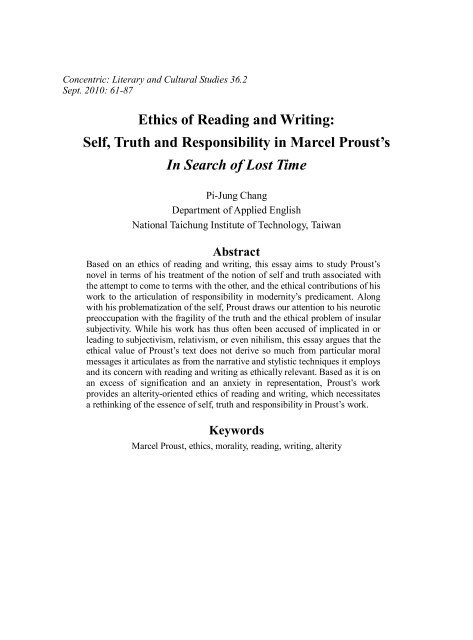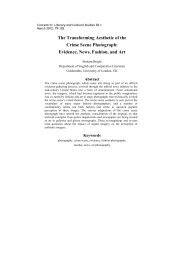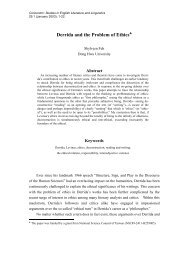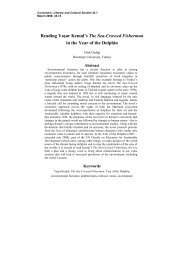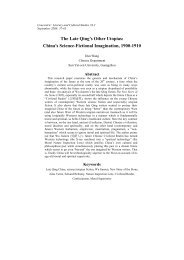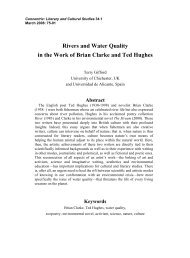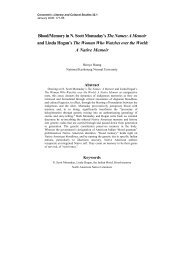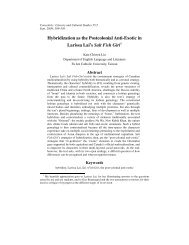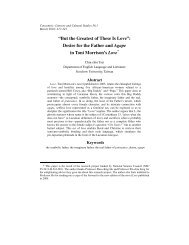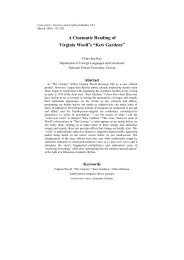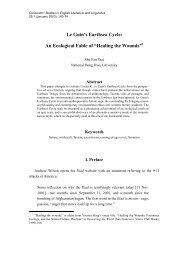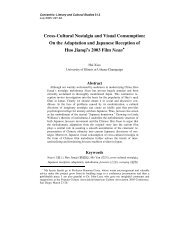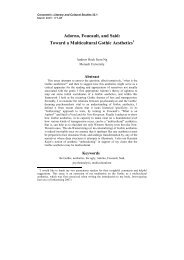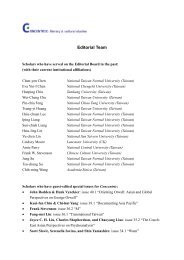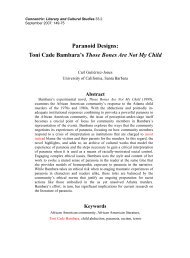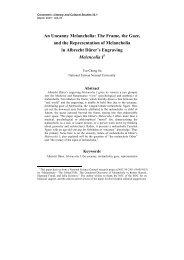Ethics of Reading and Writing: Self, Truth and ... - Concentric
Ethics of Reading and Writing: Self, Truth and ... - Concentric
Ethics of Reading and Writing: Self, Truth and ... - Concentric
You also want an ePaper? Increase the reach of your titles
YUMPU automatically turns print PDFs into web optimized ePapers that Google loves.
<strong>Concentric</strong>: Literary <strong>and</strong> Cultural Studies 36.2<br />
Sept. 2010: 61-87<br />
<strong>Ethics</strong> <strong>of</strong> <strong>Reading</strong> <strong>and</strong> <strong>Writing</strong>:<br />
<strong>Self</strong>, <strong>Truth</strong> <strong>and</strong> Responsibility in Marcel Proust’s<br />
In Search <strong>of</strong> Lost Time<br />
Pi-Jung Chang<br />
Department <strong>of</strong> Applied English<br />
National Taichung Institute <strong>of</strong> Technology, Taiwan<br />
Abstract<br />
Based on an ethics <strong>of</strong> reading <strong>and</strong> writing, this essay aims to study Proust’s<br />
novel in terms <strong>of</strong> his treatment <strong>of</strong> the notion <strong>of</strong> self <strong>and</strong> truth associated with<br />
the attempt to come to terms with the other, <strong>and</strong> the ethical contributions <strong>of</strong> his<br />
work to the articulation <strong>of</strong> responsibility in modernity’s predicament. Along<br />
with his problematization <strong>of</strong> the self, Proust draws our attention to his neurotic<br />
preoccupation with the fragility <strong>of</strong> the truth <strong>and</strong> the ethical problem <strong>of</strong> insular<br />
subjectivity. While his work has thus <strong>of</strong>ten been accused <strong>of</strong> implicated in or<br />
leading to subjectivism, relativism, or even nihilism, this essay argues that the<br />
ethical value <strong>of</strong> Proust’s text does not derive so much from particular moral<br />
messages it articulates as from the narrative <strong>and</strong> stylistic techniques it employs<br />
<strong>and</strong> its concern with reading <strong>and</strong> writing as ethically relevant. Based as it is on<br />
an excess <strong>of</strong> signification <strong>and</strong> an anxiety in representation, Proust’s work<br />
provides an alterity-oriented ethics <strong>of</strong> reading <strong>and</strong> writing, which necessitates<br />
a rethinking <strong>of</strong> the essence <strong>of</strong> self, truth <strong>and</strong> responsibility in Proust’s work.<br />
Keywords<br />
Marcel Proust, ethics, morality, reading, writing, alterity
62 <strong>Concentric</strong> 36.2 (Sept. 2010): 61-87<br />
I. Introduction<br />
In Marcel Proust’s novel, In Search <strong>of</strong> Lost Time, the reader seems to have<br />
been plunged into a universe characterized by total disorder, unintelligibility, <strong>and</strong><br />
disintegration <strong>of</strong> fundamental values. 1 The body <strong>of</strong> the novel consists in a<br />
prolonged series <strong>of</strong> pathetic <strong>and</strong> enthusiastic pursuits by Marcel, the narrator:<br />
sentimental love, the allurement <strong>of</strong> aristocratic society, <strong>and</strong> the desire for fame <strong>and</strong><br />
friendship. They all turn out to be “inevitable disappointments.” Love is subjective,<br />
selfish <strong>and</strong> self-deluding. Elegant society is a sham. It seems that the object <strong>of</strong><br />
knowledge is better understood as the object <strong>of</strong> desire—what we “discover” in<br />
objects is only what we have put there in the first place. The surest thing about<br />
people is their perverseness <strong>and</strong> the instability <strong>of</strong> their desires. On the basis <strong>of</strong> a<br />
skeptical ethics <strong>of</strong> truth <strong>and</strong> self, Proust casts doubt on many <strong>of</strong> our treasured values.<br />
His work has thus <strong>of</strong>ten been accused <strong>of</strong> purported rejection <strong>of</strong> ethical values<br />
(Edward Andrew 1995; Samuel Beckett 1987). In its variety, the ethical<br />
predicament in which Proust leaves the reader can be encapsulated in the painful<br />
recognition at which Marcel finally <strong>and</strong> painfully arrives in brooding on his lover,<br />
Albertine—that his underst<strong>and</strong>ing <strong>of</strong> Albertine’s affections <strong>and</strong> sexuality may be<br />
predicated on an extension <strong>of</strong> aspects <strong>of</strong> his own. What will haunt the whole<br />
account <strong>of</strong> Marcel’s love <strong>of</strong> Albertine, in the end, is the suspicion that “our attention,<br />
always attracted by what is characteristic <strong>of</strong> ourselves, notices it more than anything<br />
else in other people” (II: 102). 2 The suspicion that we come to know <strong>and</strong> judge<br />
others only as extensions <strong>of</strong> ourselves persists throughout the novel.<br />
Proust’s notion <strong>of</strong> self <strong>and</strong> truth is vital to his development <strong>of</strong> a skeptical<br />
ethics which is intricately related to (self-)deception <strong>and</strong> inescapable self-interest.<br />
It cannot be denied that there is a neurotically negative tone associated with these<br />
issues running throughout the novel. Nonetheless, I’ll suggest that this is redeemed<br />
by a procedure <strong>of</strong> extraordinary ethical scrupulousness <strong>and</strong> subtlety manifest in the<br />
act <strong>of</strong> reading <strong>and</strong> writing (self/other). In this paper, I’ll explore an alterity-oriented<br />
ethics <strong>of</strong> reading <strong>and</strong> writing which will be characterized by a posture <strong>of</strong> waiting<br />
1 In this study, I use the translation by Moncrieff <strong>and</strong> Kilmartin (Remembrance <strong>of</strong> Things Past.<br />
3 volumes. New York: R<strong>and</strong>om House, 1981), but the novel will be referred to under the title In<br />
Search <strong>of</strong> Lost Time, which is the more popular title used in Anglophone discussion <strong>and</strong> a more<br />
accurate rendering <strong>of</strong> the French. The latest English-language translation <strong>of</strong> this novel was<br />
published in six volumes in Britain (In Search <strong>of</strong> Lost Time, trans. Lydia Davis et al. London:<br />
Allen Lane, 2002).<br />
2 Citations from In Search <strong>of</strong> Lost Time will be given only with page numbers throughout this<br />
paper.
Chang / <strong>Ethics</strong> <strong>of</strong> <strong>Reading</strong> <strong>and</strong> <strong>Writing</strong> 63<br />
<strong>and</strong> a sense <strong>of</strong> responsibility induced by a suspicion <strong>of</strong> the insular subject <strong>and</strong><br />
contingent truth. 3 I’ll argue that the characteristic moments <strong>of</strong> recognition <strong>of</strong> the<br />
self’s blindness <strong>and</strong> limitation do, paradoxically, lead to greater self-knowledge, <strong>and</strong><br />
that self-knowledge permits action that is more, rather than less, ethically desirable,<br />
if it cannot be said to be simply “morally right.” 4 In what follows, I’ll first examine<br />
the ethical problem <strong>of</strong> perspectivism, relativism, <strong>and</strong> subjectivism with which<br />
Proust’s work has <strong>of</strong>ten been accused <strong>of</strong> failing to deal thoughtfully. The second<br />
part explores the Proustian act <strong>of</strong> reading through which the self has been<br />
“remarked” <strong>and</strong> truth redefined. The third part focuses on Proust’s treatment <strong>of</strong><br />
writing ethics wherein the artist’s function is to recompose <strong>and</strong> transform life rather<br />
than reproduce reality.<br />
In its complexity, Proust’s writing cannot be easily accommodated to rigid<br />
polarities. His text <strong>of</strong>ten draws the semantic labyrinthine quest <strong>of</strong> an ungraspable<br />
object, exposing the reader to perplexity, an effective tonality that signals an<br />
openness to discontinuities <strong>and</strong> differences. 5 Yet his dismantling <strong>of</strong> the fables <strong>of</strong><br />
unity <strong>and</strong> totality does not necessarily entail a tone <strong>of</strong> nihilism or pessimism. In<br />
Proust the ethical response to modernity’s predicament, that is, to the interruption <strong>of</strong><br />
the totality <strong>of</strong> knowledge <strong>and</strong> the guarantee <strong>of</strong> meaning, supposes an excess <strong>of</strong><br />
signification that cannot be incorporated by the coherence <strong>of</strong> discourse <strong>and</strong> thus<br />
compels us to think a different relation with <strong>and</strong> in language in the acts <strong>of</strong> reading<br />
<strong>and</strong> writing, which dem<strong>and</strong> human agency <strong>and</strong> are itself ethical commitments.<br />
The patient engagement this text encourages <strong>and</strong> the task <strong>of</strong> writing it provides<br />
suggest the possibilities engendered in the reading process <strong>and</strong> the value creation<br />
that might be brought forth by the writing activity.<br />
3 Alterity, as a poststructuralist concept <strong>of</strong> difference, refers to that which cannot be reduced to<br />
the Same <strong>and</strong> that which escapes the cognitive powers <strong>of</strong> the knowing subject. By disrupting the<br />
economy <strong>of</strong> the Same, it challenges the fundamental principle presumed by humanist ethics. For a<br />
discussion <strong>of</strong> the introduction <strong>of</strong> “alterity” into English (from French), see Spivak, who traces it to<br />
Levinas, 212.<br />
4 In this paper, I follow the vein <strong>of</strong> recent literary ethical inquiry, one <strong>of</strong> whose preoccupations<br />
is the distinction between ethics <strong>and</strong> morality. In this vein, while morality is seen as rules or codes,<br />
ethics is understood as ethical sensibility or orientation. The term “ethics” is thus an old name<br />
strategically retrieved in order to launch a new inquiry. For more detailed discussion, see<br />
Harpham, 58-60 <strong>and</strong> Cornell, 13.<br />
5 In practice, Proust’s choice <strong>of</strong> the word “recherche” emphasizes the struggle <strong>of</strong> the<br />
protagonist to pierce the mystery <strong>of</strong> time (truth) <strong>and</strong> the anguish that accompanies it. One <strong>of</strong> the<br />
underlying themes <strong>of</strong> Proust’s novel, a desperate <strong>and</strong> haunting “search” <strong>and</strong> the pursuit <strong>of</strong> a<br />
pattern <strong>of</strong> meaning, is unfortunately not suggested by the English translation “remembrance.”<br />
This is one <strong>of</strong> the reasons why the title <strong>of</strong> the novel is rendered later more literally as In Search <strong>of</strong><br />
Lost Time.
64 <strong>Concentric</strong> 36.2 (Sept. 2010): 61-87<br />
II. A World <strong>of</strong> (<strong>Self</strong>-)Deception <strong>and</strong> Subjective <strong>Truth</strong><br />
One <strong>of</strong> the most distinguishing features <strong>of</strong> the world Proust depicts is that it is<br />
a world <strong>of</strong> lies <strong>and</strong> <strong>of</strong> liars. Odette lies to Swann, Albertine lies to the narrator, <strong>and</strong><br />
Charlus lies to everybody. Lying is thus seen as a central activity, both in public <strong>and</strong><br />
in private, leading to incessant deceptions. Most impressively, the Proustian hero,<br />
Marcel, has a personal habit or tradition <strong>of</strong> writing deceitful letters. He first writes<br />
such a letter to his mother in Combray, a letter intended to get her to come upstairs<br />
<strong>and</strong> kiss him goodnight. Later, the hero continues in this guise when he writes<br />
Albertine that he intends to spend time with Andree in order to make Albertine<br />
jealous <strong>and</strong> return. Simplicity <strong>and</strong> frankness, those virtues admired in classical<br />
moral philosophy, do not appear unadorned or “as such” in Proust, but rather<br />
clothed <strong>and</strong> disguised. Ultimately, this novel represents the notion that life lies.<br />
Indeed, one <strong>of</strong> the main trajectories <strong>of</strong> this novel consists in Marcel’s learning to<br />
ab<strong>and</strong>on the quest for objective truth <strong>and</strong> to focus instead on subjective truth <strong>and</strong> his<br />
own inner nature. Accurate knowledge <strong>of</strong> the external world is so elusive that it<br />
seems that reality is in the eyes <strong>of</strong> the beholder.<br />
However, it is also impossible for us to access our inner essence—let alone to<br />
communicate it to others—because every person is a prisoner, a prisoner <strong>of</strong> her own<br />
temperament <strong>and</strong> desire, shut up in herself as the narrator is shut up in his room.<br />
While all the characters are lying, all <strong>of</strong> them lie first <strong>and</strong> most pr<strong>of</strong>oundly to<br />
themselves. The narrator thus laments: “Man is the creature who cannot escape<br />
from himself, who knows other people only in himself, <strong>and</strong> when he asserts the<br />
contrary, he is lying” (III: 459). Marcel has a precedent in his own family for<br />
fictionalizing Swann. Mama, Papa, <strong>and</strong> various aunts had “built up for their<br />
purposes” (I: 15) a version <strong>of</strong> Swann that suited their aim <strong>of</strong> avoiding the fact that<br />
Swann frequented high places <strong>and</strong> low places in addition to their own middle-class<br />
home. The aunts Celine <strong>and</strong> Flora possess to an even higher degree the precious<br />
ability <strong>of</strong> not perceiving; they stop listening the moment the conversation changes<br />
in their presence to something which does not interest them. “Their sense <strong>of</strong><br />
hearing . . . would leave its receptive channels unemployed, so effectively that they<br />
were actually becoming atrophied” (I: 59). The “organic falsehood” functions every<br />
time someone wishes to see only that which serves his interest or some other<br />
disposition <strong>of</strong> his instinctive attention. In fact, people who delude themselves in this<br />
way no longer need to lie.<br />
The predicament <strong>of</strong> insular subjectivity leads to the impossibility <strong>of</strong> love<br />
because all love is subjective. While there are no qualities in the beloved that attract
Chang / <strong>Ethics</strong> <strong>of</strong> <strong>Reading</strong> <strong>and</strong> <strong>Writing</strong> 65<br />
the lover, the lover projects imaginary qualities onto the beloved from the beam <strong>of</strong><br />
his sexual desire. 6 More than anyone else in Proust’s novel, Swann <strong>and</strong> the narrator<br />
acknowledge the selfish exaltation <strong>of</strong> the lover who is in love with his or her own<br />
love. At first, Odette is not naturally attractive to Swann; she <strong>of</strong>fends his taste <strong>and</strong> is<br />
most definitely not his type. A decisive moment in the early phase <strong>of</strong> their<br />
relationship occurs when Swann “recognizes” in Odette the type <strong>of</strong> Jewish wife<br />
portrayed by Botticelli. Once this recognition has taken effect, Odette’s features<br />
acquire nobility <strong>and</strong> are assimilated to Swann’s cult <strong>of</strong> the aesthetic. This spurious<br />
move enables Swann to deceive his own intelligence—his delusion that he<br />
“possesses” in Odette something <strong>of</strong> what he appreciates in the art <strong>of</strong> Botticelli.<br />
Similarly, the loveliness <strong>of</strong> Albertine derives from Marcel’s love. What the<br />
narrator has learned from his repeated experiences is that love is merely a mirror<br />
one holds out to a woman without ever seeing in it anything but one’s own image.<br />
Since desire consists <strong>of</strong> dissolving loved ones in the lover’s own perceptions, the<br />
subjective nature <strong>of</strong> love is placed <strong>and</strong> replaced in any object <strong>of</strong> desire:<br />
If . . . Albertine might be said to echo something <strong>of</strong> the old original<br />
Gilbert, that is because a certain similarity exists, although the type<br />
evolves, between all the women we successively love, a similarity<br />
that is due to the fixity <strong>of</strong> our own temperament, which chooses them.<br />
(I: 905)<br />
Marcel comes to realize that “my love was not so much a love for her as a love in<br />
myself,” a love that is entirely “subjective” <strong>and</strong> might, “like every mental state,<br />
even the most lasting, find itself one day obsolete, be replaced” (III: 568). He thus<br />
concludes that he can only love himself in others <strong>and</strong> that is why he can constantly<br />
reinvent love through a series <strong>of</strong> substitutions that reflect his own being.<br />
More specifically, what Marcel felt for Albertine was not love but the passion<br />
<strong>of</strong> possessiveness. The pattern is a familiar one, following that <strong>of</strong> Swann in love <strong>and</strong><br />
Marcel in love: the intensity <strong>of</strong> the lover’s pursuit is proportionate to the<br />
unattainability <strong>of</strong> the loved one. When there is no danger <strong>of</strong> his losing Odette,<br />
Swann is quite happy to bear the idea <strong>of</strong> her departure (I: 345). Likewise, for<br />
Marcel, once Albertine is “caged,” she loses all her colors “along with all the<br />
6 In Beyond Good <strong>and</strong> Evil, Nietzsche also asserts that “[t]he sexes deceive themselves about<br />
each other—because at bottom they honor <strong>and</strong> love only themselves” (93). The basis <strong>of</strong> value is<br />
consumer dem<strong>and</strong>: “In the end one loves one’s desire <strong>and</strong> not what is desired” (93). For a<br />
discussion <strong>of</strong> Nietzsche’s <strong>and</strong> Proust’s value-discourses related to love, see Andrew’s The<br />
Genealogy <strong>of</strong> Values, 39-47.
66 <strong>Concentric</strong> 36.2 (Sept. 2010): 61-87<br />
opportunities that other people had <strong>of</strong> securing her for themselves. Gradually she<br />
had lost her beauty” (III: 171). Her disappearance is enough to rekindle her<br />
possessor’s desire. What enslaves Marcel, as it had enslaved Swann, is their shared<br />
desire, insatiable in a precise sense, to gain control, through knowledge, <strong>of</strong> all the<br />
secret motives <strong>and</strong> actions <strong>of</strong> their respective mistresses. But for all his incessant<br />
interrogation <strong>and</strong> investigation, what Marcel seeks, at bottom, is not the truth but a<br />
convincing lie, a lie with the power to send all his doubts to sleep. In fact, Marcel<br />
never manages to establish the definitive truth <strong>of</strong> Albertine. Each <strong>of</strong> his informants’<br />
claims is undermined as they are presented as unreliable. The keeper <strong>of</strong> the<br />
bathhouse, the source <strong>of</strong> the information about Albertine’s lesbian past, is “a woman<br />
who must suffer from the disease <strong>of</strong> mendacity” (III: 552). Similarly, Marcel claims<br />
that Aime, another informant, has his complete confidence even as he tells us<br />
“Aime is utterly unscrupulous” (III: 523). In other words, whether it concerns<br />
Albertine’s infidelities or his own attitude toward the truth, there comes a point at<br />
which Marcel, following a benevolent instinct <strong>of</strong> self-preservation, does not dare to<br />
look too closely, does not want to know. He is dimly aware that he has perpetrated a<br />
deception on himself, one which has allowed his love for Albertine to stay alive <strong>and</strong><br />
which will constitute all future loves. “My happiness, my life required that<br />
Albertine should be virtuous. . . . Armed with this self-protective belief, I could with<br />
impunity allow my mind to play sadly with suppositions to which it gave a form but<br />
lent to credence” (III: 624). Instead <strong>of</strong> clear-sighted resignation, Marcel’s response<br />
is self-deception.<br />
Hence, it seems that the narrator’s hypothesizing is not so much “an attempt at<br />
causal explanation” as a demonstration <strong>of</strong> the failure <strong>of</strong> hypotheses. In other words,<br />
those hypothesizing scientific efforts may not suggest the power <strong>of</strong> the investigating<br />
mind, but rather the reverse—“the ineptness <strong>of</strong> hypothesizing, its comic futility”<br />
(Gray 57). Hypothesizing would seem merely to produce, not overcome,<br />
mystification. For instance, the narrator speculates as to why the Guermantes treat<br />
their cousin Madame de Gallardon with so much disdain. The narrator’s<br />
hypothesizing ends in a surprisingly anticlimactic statement: “perhaps because she<br />
was boring, or because she was disagreeable, or because she was from an inferior<br />
branch <strong>of</strong> the family, or perhaps for no reason at all” (I: 323). The helpless <strong>and</strong><br />
arbitrary product <strong>of</strong> hypothesizing may thus be not knowledge <strong>and</strong> illumination but<br />
the imposition <strong>of</strong> maxims: the very impossibility <strong>of</strong> knowing produces shrill<br />
proclamations <strong>of</strong> universal laws. The narrator’s moralizing truths emerge as a patent<br />
cover for his own failure to underst<strong>and</strong> <strong>and</strong> master the world through knowledge.<br />
Unable to know the world, he elevates his lack <strong>of</strong> knowledge to the level <strong>of</strong>
Chang / <strong>Ethics</strong> <strong>of</strong> <strong>Reading</strong> <strong>and</strong> <strong>Writing</strong> 67<br />
universal truth <strong>and</strong> imposes it by maxim.<br />
If love is a fantasy, communion with others an unattainable longing <strong>and</strong><br />
knowledge a delusion, we have nothing to rely on but can only live in a mirage.<br />
As Edward Andrew puts it, Proust’s concept <strong>of</strong> value signifies “relativity,<br />
contingency, <strong>and</strong> inequality” (xix). For all that, it is important to emphasize that the<br />
philosophy subtending Proust’s novel is not a sweeping relativism or subjective<br />
idealism, let alone a nihilism. We know that a world <strong>of</strong> perspective-independent<br />
objects exists outside <strong>of</strong> our mind. The clearest pro<strong>of</strong> is that life constantly manages<br />
to surprise us, defying any actual or even potential expectation on our part.<br />
Surprises can be unpleasant or they can be welcome, as with “women whom it was<br />
impossible to imagine a priori” (III: 26). Either way, surprises prove to us that we<br />
have not dreamed the world, that it exceeds our projection-making capacity.<br />
Besides, if Proust’s narrator sees an extreme limit to the ability <strong>of</strong> the self to<br />
overcome its own prejudices or to communicate with others, it is just this<br />
recognition <strong>of</strong> limit that is characteristic <strong>of</strong> Proustian ethics <strong>of</strong> which the task is to<br />
interrogate. The absence <strong>of</strong> an absolute self might, on the contrary, make it easier<br />
for the self that does exist to expose itself to the alterity <strong>of</strong> the unscrutable Other;<br />
the inadequacy <strong>of</strong> definition might encourage the writer to write values that have<br />
never been written before. In the following sections, rather than concentrating on<br />
the identity <strong>of</strong> a totalized self <strong>and</strong> security <strong>of</strong> moral values, I aim to think about<br />
issues concerning the reading process <strong>and</strong> the act <strong>of</strong> writing, which involve a<br />
rethinking <strong>of</strong> the category <strong>of</strong> self, <strong>and</strong> the essence <strong>of</strong> truth <strong>and</strong> ethical responsibility<br />
in Proust’s work.<br />
III. Encountering Alterity in the <strong>Reading</strong> Process<br />
In many ways the novel is about the act <strong>of</strong> reading, <strong>and</strong> the oppression which<br />
the narrator causes the heroine could be understood as the diegetic equivalent <strong>of</strong><br />
jealous readers’ eagerness to assign an unambiguous meaning to a novel, one<br />
designed to defy such a reading in the first place. 7 Proust’s text dem<strong>and</strong>s that the<br />
reader, like the narrator encountering the absence <strong>of</strong> woman, be haunted by alterity<br />
in the process <strong>of</strong> reading, but (s)he is well <strong>and</strong> wisely haunted. The desire to<br />
appropriate an inscrutable Other is constantly resisted. This novel promotes a sense<br />
<strong>of</strong> responsibility in readers by inviting attentiveness, engagement, <strong>and</strong> tolerance <strong>of</strong><br />
7 “Jealousy” in Proust’s novel does not resemble what is commonly meant by the term. In a<br />
certain sense, it involves an obsessive semiotic inquiry. For an informed discussion <strong>of</strong> the<br />
hermeneutic dimension <strong>of</strong> Proustian jealousy, see Walsh’s account in his article.
68 <strong>Concentric</strong> 36.2 (Sept. 2010): 61-87<br />
otherness, readerly skills which, this text suggests, translate to greater, more<br />
imaginative engagement in interpersonal relationships <strong>and</strong> perception <strong>of</strong> truth.<br />
Scene <strong>and</strong> Staging <strong>of</strong> <strong>Reading</strong>:<br />
Limitation <strong>of</strong> <strong>Self</strong>-Consciousness<br />
At the very beginning <strong>of</strong> the novel, the narrator makes a seemingly<br />
epistemological claim about the possibility <strong>of</strong> humans’ attaining an immediate<br />
intuition <strong>of</strong> other human beings. Here a kind <strong>of</strong> desired communion with the<br />
external world is presented in semi-dream state that can produce the fusion <strong>of</strong> self<br />
<strong>and</strong> matter: “I had gone on thinking, while I was asleep, about what I had just been<br />
reading, but these thoughts had taken a rather peculiar turn; it seemed to me that I<br />
myself was the immediate subject <strong>of</strong> my book: a church, a quartet, the rivalry<br />
between Francois I <strong>and</strong> Charles V” (I: 1). In a main text on reading occurring later<br />
in the same volume <strong>of</strong> the novel, the narrator, reflecting on his reading, comes to<br />
underst<strong>and</strong> his own consciousness as a limit beyond which he cannot pass in any<br />
attempt to achieve an immediate perception <strong>of</strong> external reality. He observes:<br />
When I saw an external object, my consciousness that I was seeing it<br />
would remain between me <strong>and</strong> it, surrounding it with a thin spiritual<br />
border that prevented me from ever touching its substance directly;<br />
for it would sometimes evaporate before I could make contact with it,<br />
just as an inc<strong>and</strong>escent body that is brought into proximity with<br />
something wet never actually touches its moisture, since it is always<br />
preceded by a zone <strong>of</strong> evaporation. (I: 90)<br />
Finally, at the end <strong>of</strong> the novel, the narrator recalls a similar recognition expressed<br />
in the first-person plural: “For between us <strong>and</strong> other people there exists a border <strong>of</strong><br />
contingencies, just as in my hours <strong>of</strong> reading in the garden at Combray I had<br />
realized that in all perception there exists a border as a result <strong>of</strong> which there is never<br />
absolute contact between reality <strong>and</strong> our intelligence” (III: 1023).<br />
In fact, Proust’s concern about reading <strong>and</strong> consciousness has been manifest<br />
in the pre-Recherche period. In the introduction to Sesame et les lys collected in On<br />
<strong>Reading</strong> Ruskin, Proust contrasts the febrile excitement <strong>of</strong> social relationships with<br />
the otherworldly calm one can attain through reading: “<strong>Reading</strong> is a friendship. . . .<br />
That atmosphere <strong>of</strong> this pure form <strong>of</strong> friendship is silence, which is purer than<br />
speech” (123). If social relationships—“the agitations <strong>of</strong> friendship” (123)—
Chang / <strong>Ethics</strong> <strong>of</strong> <strong>Reading</strong> <strong>and</strong> <strong>Writing</strong> 69<br />
produce a kind <strong>of</strong> hysteria <strong>of</strong> de-centredness in Proust, reading restores a sense <strong>of</strong><br />
protectedness <strong>and</strong> wholeness that is healing. One <strong>of</strong> the important aspects <strong>of</strong><br />
communicating with a written text is that, rather than imposing its existence on us,<br />
it allows us to exp<strong>and</strong> <strong>and</strong> grow, to strengthen our own personality by co-opting <strong>and</strong><br />
absorbing elements <strong>of</strong> the Other. “When we read, we receive another individual’s<br />
thought, <strong>and</strong> yet we are alone, our thoughts actively at work, aspiring, in full<br />
personal activity” (Proust, On <strong>Reading</strong> Ruskin 70). Proust finds tranquility in the<br />
self-reflection <strong>of</strong> reading, an activity in which the text <strong>of</strong> the Other becomes a<br />
calming, reflecting mirror for the self.<br />
While there is a hallucinatory quality about Proust’s comments on reading in<br />
his preface to Sesame et les lys quoted above, reading is staged, in his own novel, in<br />
a dramatic contest <strong>of</strong> defenses <strong>and</strong> threats: an inner, sheltered place (bower, closet,<br />
room, cradle) that has nevertheless been threatened by the collapse <strong>of</strong> categorical<br />
values <strong>and</strong> uncertainty <strong>of</strong> perception. The introductory passage on reading was<br />
placed under the auspices <strong>of</strong> the epistemological couple <strong>of</strong> truth <strong>and</strong> error, which<br />
introduces a complex sequence <strong>of</strong> meditations on the reading <strong>of</strong> allegory <strong>and</strong> the<br />
allegory <strong>of</strong> reading. The description <strong>of</strong> Françoise <strong>and</strong> the kitchen maid is the first<br />
explicit example <strong>of</strong> the narrators’ ritualistic initiation to the ambivalences <strong>of</strong> good<br />
<strong>and</strong> evil. Françoise, thought by the boy to be a veritable “Michelangelo <strong>of</strong> the<br />
kitchen,” suddenly emerges as a dark <strong>and</strong> cruel figure, bloodthirsty in her violent<br />
slaying <strong>of</strong> the chicken, <strong>and</strong> outright sadistic in her treatment <strong>of</strong> the pregnant kitchen<br />
maid:<br />
While the kitchen maid—unwittingly making Françoise’s superiority<br />
shine at its brightest, just as Error, by contrast, makes the triumph <strong>of</strong><br />
<strong>Truth</strong> more dazzling—served c<strong>of</strong>fee which, in my mother’s judgment,<br />
was mere hot water <strong>and</strong> then carried to our rooms hot water that was<br />
barely tepid, I had stretched out on my bed, with a book. (I: 89)<br />
Another scene <strong>of</strong> reading is staged when Marcel is presented as mystified by<br />
the chasm between the name “Caritas” <strong>and</strong> the reality <strong>of</strong> the humble, energetic<br />
figure with which it is associated—whether in the fresco or in the pregnant kitchen<br />
maid whom Swann had dubbed “la Charite de Giotto.” Unlike Swann, who is<br />
satisfied by the play <strong>of</strong> wit which discerns in Odette a Botticelli <strong>and</strong> in the kitchen<br />
maid a Giotto, Marcel is puzzled by his own reaction to the figures on the fresco.<br />
These figures are in a sense repulsive, they do not fit in with his expectations, yet<br />
they have “an arresting strangeness” (I: 96) <strong>and</strong> a special beauty. The narrator
70 <strong>Concentric</strong> 36.2 (Sept. 2010): 61-87<br />
finally gives a concluding remark to this experience which serves as an indication<br />
<strong>of</strong> the nature <strong>of</strong> the path along which he has traveled toward the maturity <strong>of</strong> his<br />
literary vocation:<br />
Later on, I understood that the uncanny attraction, the specific beauty<br />
<strong>of</strong> these frescoes was due to the prominent place taken up by the<br />
symbol, <strong>and</strong> that the fact that it was not represented symbolically<br />
(since the symbolized idea was not expressed) but as something real,<br />
actually experienced or materially h<strong>and</strong>led, gave to the meaning <strong>of</strong><br />
the work something more literal <strong>and</strong> more precise. (I: 96)<br />
In other words, the pregnant kitchen maid <strong>and</strong> Giotto’s Charity, far from being<br />
abstractions, are figures which draw us into reality <strong>and</strong> make us underst<strong>and</strong> that it is<br />
we who, in our normal lives, maintain purely abstract <strong>and</strong> unrealistic notions <strong>of</strong><br />
what charity or pregnancy might be. The frescoes <strong>of</strong> the Arena Chapel <strong>and</strong> the<br />
kitchen maid are imbricated to form the prelude to readers’ engagement in the<br />
process <strong>of</strong> reading, which is, in another sense, the process <strong>of</strong> the play <strong>of</strong> self <strong>and</strong><br />
other, truth <strong>and</strong> falsehood, or the gulf between language <strong>and</strong> its referents.<br />
Voice as Awareness<br />
It is against such a scene <strong>and</strong> staging <strong>of</strong> reading that the reader can be inspired<br />
to observe in Proust’s novel his concern with self/other relationship featured by a<br />
shift from voice as an emanation <strong>of</strong> the essence <strong>of</strong> character to voices in conflict<br />
with singular consciousness. Considerations <strong>of</strong> voice have mostly been understood<br />
as expressions <strong>of</strong> identity. With critics such as Jacques Derrida <strong>and</strong> Mikhail Bakhtin,<br />
however, we have learned to underst<strong>and</strong> voice apart from its service to subjecthood.<br />
Formulating this myth <strong>of</strong> voice as presence, Derrida wrote: “No awareness is<br />
possible without voice; voice is awareness” (89). In a similar vein, Bakhtin<br />
resituates voice as an index not <strong>of</strong> singular presence, but as the site <strong>of</strong> vigorous<br />
oppositions, the struggle between “one’s own <strong>and</strong> another’s word” (326). Such an<br />
emptying-out <strong>of</strong> the self in favor <strong>of</strong> a fictive voice <strong>of</strong>fers a model <strong>of</strong> reading what<br />
may be at work in the construction <strong>of</strong> a subject in Proust’s novel. Proust has hardly<br />
created a fleshy character or what E. M. Foster would call a “round character.”<br />
In Proust, character is displaced by a pr<strong>of</strong>usion <strong>of</strong> voices <strong>and</strong> the reader cannot help<br />
but wonder: “Is Swann a character Does he have one” Similarly, Albertine is like<br />
a draft <strong>of</strong> a character struggling to emerge. “Like a medium whose body is inhabited
Chang / <strong>Ethics</strong> <strong>of</strong> <strong>Reading</strong> <strong>and</strong> <strong>Writing</strong> 71<br />
by another being, she would change personalities, almost instantly she would stop<br />
having her usual voice <strong>and</strong> would take on the voice <strong>of</strong> another person, a hoarse,<br />
bold, almost debauched voice” (III: 403). Another obvious example is Charlus,<br />
whose voice reveals a split personality. In their first meeting in Balbec, what struck<br />
the narrator about the baron was his voice, “like certain contralto voices in which<br />
the middle register has not been sufficiently cultivated, so that when they sing it<br />
sounds like an alternating duet between a young man <strong>and</strong> a woman,” a voice that<br />
seems to shelter a “bevy <strong>of</strong> young girls” (II: 122). The other major characters,<br />
including Odette, Legr<strong>and</strong>in, <strong>and</strong> Saint-Loup, all head a lengthy roll-call <strong>of</strong> Protean<br />
figures in the novel. The search to explain or identify a character leads to a<br />
proliferation <strong>of</strong> images <strong>and</strong> voices.<br />
More precisely, an interest in character is replaced by an examination <strong>of</strong> the<br />
mobile <strong>and</strong> fluid interrelations among shadowy <strong>and</strong> half-represented figures. The<br />
reader is constantly compelled to wonder: is it Block, Swann, or the narrator Is it<br />
the duchesse de Guermantes, the princess de Guermantes, the Virgin, or even Mme<br />
Verdurin raised to the highest social rank Each <strong>of</strong> the characters is intended as a<br />
version <strong>of</strong> a previous one with the resulting proliferation <strong>of</strong> characters who are<br />
uncanny echoes <strong>of</strong> one another. 8 The proliferation <strong>of</strong> characters, like that <strong>of</strong><br />
sentences, is open to change <strong>and</strong> progresses by way <strong>of</strong> cutting, disengaging, <strong>and</strong><br />
displacing. Julia Kristeva comments upon the fluid, interchangeable identities <strong>of</strong><br />
Proust’s characters:<br />
What used to be Swann is now Bloch or myself. The duchesse de<br />
Guermantes gives up her wild rose to enjoy some <strong>of</strong> Odette’s<br />
pinkness. The entire cast <strong>of</strong> characters is constantly cut open <strong>and</strong><br />
stitched back together in order to provide a closer look into the<br />
thous<strong>and</strong>-<strong>and</strong>-one faces assumed by the narrator. (121)<br />
Truly, as both character <strong>and</strong> narrator, Marcel exists as the most complex <strong>and</strong><br />
multifarious amalgamation <strong>of</strong> all the characters. He sees things sometimes from the<br />
point <strong>of</strong> view <strong>of</strong> the immediate present when he does not know his fate, at others<br />
8 This conception <strong>of</strong> subjectivity foreshadows the one explored by Lacan. As he elaborates it in<br />
The Four Fundamental Concepts <strong>of</strong> Psychoanalysis, the subject <strong>of</strong> perception or <strong>of</strong> interpretation<br />
is not really discrete; the phenomenological subject who “sees himself seeing” is subject to<br />
illusion (93). Hence, any absolute separation <strong>of</strong> <strong>Self</strong> <strong>and</strong> Other do not seem particularly ethical.<br />
Instead, it is in his relation to the semantic duplicity <strong>of</strong> the unconscious—that is, in<br />
intersubjectivity—that the subject is “at home” (44). For Lacan, the subject has an ethical<br />
imperative to travel to this place.
72 <strong>Concentric</strong> 36.2 (Sept. 2010): 61-87<br />
from the point <strong>of</strong> view <strong>of</strong> the older, reflective, retrospective author. 9 In other words,<br />
Marcel’s “I” registers reflexively every encounter with the world as a reconstitution<br />
<strong>of</strong> his ego, while his other “I” experiences the world in apparent “immediacy.”<br />
The first-person pronoun “moi” is fluid <strong>and</strong> unstable.<br />
In fact, despite the autobiographical impetus, Proust’s novel tells us little <strong>of</strong><br />
the “essence” <strong>of</strong> Marcel, replacing that by a series <strong>of</strong> shifting relations with Swann,<br />
Albertine, Saint-Loup, <strong>and</strong> so one. It follows that the “identity” which the reader<br />
proposes for Marcel at the close <strong>of</strong> the novel is to undergo a differential<br />
epistemological shift in a reiteration <strong>of</strong> the reading <strong>of</strong> the character. Constantly<br />
altered <strong>and</strong> diversified by his language, the narrator exemplifies the purely verbal<br />
origins <strong>of</strong> a human life. In the words <strong>of</strong> Rol<strong>and</strong> Barthes: “the subject is immediately<br />
contemporary with the writing, being effected <strong>and</strong> affected by it. The case <strong>of</strong><br />
Proustian narrator is exemplary, he exists only in writing” (143). Gilles Deleuze<br />
insists on the narrator’s absence <strong>of</strong> mind <strong>and</strong> body <strong>and</strong> equates it with madness.<br />
He asserts that Proust’s narrator “doesn’t function as a subject” (271). He is<br />
“incapable <strong>of</strong> seeing, <strong>of</strong> perceiving, <strong>of</strong> remembering, <strong>of</strong> underst<strong>and</strong>ing” (271). And<br />
yet, this curious case <strong>of</strong> madness is just the catalyst which “mocks characterization,<br />
jeopardizes knowledge, initiates the search, <strong>and</strong> engenders time <strong>and</strong> interpretation”<br />
(Aynesworth 32). As Paul de Man puts it, “the mood <strong>of</strong> distrust, as the later story <strong>of</strong><br />
Marcel’s relationship with Albertine makes clear, produces rather than paralyzes<br />
interpretative discourse. <strong>Reading</strong> has to begin in this unstable commixture <strong>of</strong><br />
literalism <strong>and</strong> suspicion” (184). The self is disengaged in order to engage itself with<br />
an ethics <strong>of</strong> reading the other.<br />
An <strong>Ethics</strong> <strong>of</strong> Response <strong>and</strong> Responsibility<br />
In the presentation <strong>of</strong> the major characters’ love affairs, especially that <strong>of</strong> the<br />
narrator, Proust shows his concern with the conditions in which love <strong>of</strong> the other<br />
<strong>and</strong> responsibility toward the other can be possible. The novel follows through one<br />
frustration, disappointment or failure in love after another. If Marcel invariably ends<br />
up with women who cause him pain, it is perhaps simply as an unintended<br />
consequence <strong>of</strong> his inexorable yearning for the radically different. A woman he<br />
finds appealing will always <strong>and</strong> necessarily convey a mystique, a prestige. He will<br />
9 Bakhtin observes similarly that even if a writer narrates an event that has just occurred, the<br />
“teller” is already removed from the time <strong>and</strong> space <strong>of</strong> the narrated event (256). The idea is<br />
reiterated by Barthes: “The I who recounts is no longer the same as the one that is recounted”<br />
(162).
Chang / <strong>Ethics</strong> <strong>of</strong> <strong>Reading</strong> <strong>and</strong> <strong>Writing</strong> 73<br />
always prefer an Albertine, dangerously divergent, to an Andree who is “too like<br />
myself” (I: 1006). Albertine’s mystery provokes Marcel to anxious hermeneutic<br />
efforts which, however, collapse in an endlessly unanswered question: “As for<br />
Albertine, I felt that I would never discover anything, that, out <strong>of</strong> that tangled mass<br />
<strong>of</strong> factual details <strong>and</strong> falsehoods, I would never unravel the truth; <strong>and</strong> that it would<br />
always be so” (III: 131).<br />
However, in his reading <strong>of</strong> Proust’s novel, Emmanuel Levinas declares that<br />
Marcel’s despair in his love affairs “is an inexhaustible source <strong>of</strong> hope” (“The Other<br />
in Proust” 165). For Levinas, ethics or love begins at precisely the point where<br />
Albertine as other escapes confinement by Marcel as subject. Hence, “[t]o know<br />
what Albertine does, what Albertine sees, who sees Albertine, is <strong>of</strong> no interest in<br />
itself as a form <strong>of</strong> knowledge, but is infinitely exciting because <strong>of</strong> its fundamental<br />
strangeness in Albertine, the strangeness which mocks knowledge” (“The Other in<br />
Proust” 163). The central problematic that Levinas explores is the self’s practice <strong>of</strong><br />
reducing everything to the Same <strong>and</strong> its resulting failure to relate adequately to the<br />
Other, to absolute alterity. According to Levinas’s “philosophy <strong>of</strong> the other,” the<br />
language <strong>of</strong> ethics has come to designate a singular <strong>and</strong> counter-universal relation<br />
with <strong>and</strong> response to the other person as other. In contrast to the mode based on<br />
mimetic closure, Levinasian ethics explores the infinite rapport provoked by alterity<br />
that will overwhelm the subject in a flood <strong>of</strong> responsibility. 10 In this sense,<br />
Marcel’s fragmented mistress dissolves into a space; Proust uses exactly that word<br />
“infinity” (III: 393) to denote the utter alterity <strong>of</strong> the young girl, the measureless<br />
<strong>and</strong> unpossessable life <strong>of</strong> the loved one.<br />
The narrator’s hermeneutic efforts to decipher his objects <strong>of</strong> desire may best<br />
be described as an effort to appropriate what he needs to know. The desire to<br />
appropriate the identity <strong>and</strong> physical being <strong>of</strong> an inscrutable Other is motivated by<br />
an envious need to complete the self by means <strong>of</strong> the Other’s qualities. The more<br />
different the Other, the more envious one hungers for that alterity, as if it could cure<br />
the <strong>Self</strong>’s deficiency. In short, the needs <strong>of</strong> the characters in question are consuming,<br />
even vampirish. 11 We are witnesses to an instance <strong>of</strong> what Michel Riffaterre calls<br />
10 Responsibility traditionally entails freedom <strong>of</strong> choice. Approaching Levinas, however, we<br />
have to have recourse to a different underst<strong>and</strong>ing <strong>of</strong> responsibility. For Levinas, “responsibility”<br />
connotes “response-ability” <strong>and</strong> a “response” is importantly different for him than an “action.” In<br />
other words, in Levinas’s view, ethics lies not in the responsibility implicit in my freely chosen<br />
acts but in the responsibility by which I find myself gripped or “taken hostage” when confronted<br />
with alterity.<br />
11 In this novel, a series <strong>of</strong> jealous characters foreshadow <strong>and</strong> double the narrator’s own<br />
jealousy for Albertine. One <strong>of</strong> these is Swann, whose relationship with Odette is a prelude to the
74 <strong>Concentric</strong> 36.2 (Sept. 2010): 61-87<br />
“the whole system <strong>of</strong> desire, <strong>of</strong> possession, <strong>of</strong> the self’s absorption <strong>of</strong> its prey” as<br />
this system is “endlessly repeated in the Proustian narrative” (451). However, at the<br />
Levinasia ethical moment, what the desire encounters is a radical, unpredictable <strong>and</strong><br />
irreducible resistance to it. Albertine is the enigma that evades Marcel’s would-be<br />
authorial control. Even more importantly, as a lesbian, she is radically<br />
heterogeneous to the terms <strong>of</strong> his wisdom. 12 The alterity that the generalizing<br />
discourse seeks to subdue constantly re-emerges to threaten it all over again.<br />
Through Albertine, the narrator realizes his own limitations as a possessing subject.<br />
Hence, the narrative voice is forced to tack, revise, take new directions, <strong>and</strong><br />
surrender itself to multiplicity <strong>and</strong> contradiction. At first, Marcel’s claim for<br />
mimetic control—the absorption <strong>of</strong> what is “other,” “outside,” as one’s own in a<br />
closed narcissistic space—is revealed when he appropriates Albertine’s highly<br />
figural discourse as his own: “But for me she wouldn’t speak thus, she has<br />
pr<strong>of</strong>oundly experienced my influence. . . . She is my creation” (III: 636). For many<br />
times, Marcel restates such claims for mastery—Albertine’s eloquence is “a pro<strong>of</strong><br />
that I had power over her, that she loved me” (III: 638). But then Marcel’s sentence<br />
goes on to qualify Albertine’s speech as somehow out <strong>of</strong> context, transgressive,<br />
menacing: “ . . . these words, however, that I would never have uttered, as though I<br />
had been somehow forbidden by an unknown authority ever to use literary forms in<br />
conversation” (III: 641). Marcel’s question falls back upon himself to bewilder its<br />
own—now highly ironized—“author.” The narrator himself becomes the one<br />
mastered—the one “written.” Ultimately Marcel’s failure in the position <strong>of</strong><br />
possessing subject throws into question the stable hierarchy <strong>of</strong> the subject/object<br />
distinction. In other words, alterity is understood not merely as a feature <strong>of</strong> an<br />
exterior world but as intrinsic to subjectivity itself. Marcel finally understood, not<br />
only that Albertine was never <strong>and</strong> could by definition never have been in his<br />
possession, but that he himself was never in possession <strong>of</strong> himself in relation to her.<br />
The otherness that is alternately feared <strong>and</strong> contemplated with benevolent concern<br />
is admitted as something deeper than either irrational fear or moral benevolence—<br />
Albertine episodes. Swann shares with the narrator an intellectual motive for pursuing the elusive<br />
heroine; that is, he is motivated more by the need for knowledge than by love (I: 274). The<br />
narrator’s informed psychological description suggests his own subsequent “passion for truth.”<br />
The theme <strong>of</strong> the jealous reader (lover) passes from Swann <strong>and</strong> Odette to the narrator <strong>and</strong> Gilberte,<br />
to Charlus <strong>and</strong> Morel <strong>and</strong> to the narrator <strong>and</strong> Albertine.<br />
12 Charlus, like Marcel, is confounded by a lesbian desire that not only arouses his jealousy,<br />
but stymies his underst<strong>and</strong>ing. “The Baron . . . felt himself tormented by an anxiety <strong>of</strong> the mind as<br />
well as <strong>of</strong> the heart, confronted with this double mystery in which the arousal <strong>of</strong> his jealousy was<br />
combined with the sudden inadequacy <strong>of</strong> a definition” (III: 721).
Chang / <strong>Ethics</strong> <strong>of</strong> <strong>Reading</strong> <strong>and</strong> <strong>Writing</strong> 75<br />
as a part <strong>of</strong> the self that is as intimate as one’s most intense <strong>and</strong> enduring sorrows.<br />
As has been stated above, Proust’s treatment <strong>of</strong> the encounter with the other is<br />
that <strong>of</strong> what Walter Benjamin finely called a “merciless deglamorizer <strong>of</strong> the ego”<br />
(212). But for the event <strong>of</strong> the ethical encounter to be possible, there must<br />
nonetheless be a subjectivity there in the first place to collapse or recognize its<br />
limits. 13 Therefore, in Proust’s novel, a substantial self <strong>and</strong> solid subjectivity is<br />
abolished <strong>and</strong> required at the same time. While Marcel is constantly disengaged <strong>and</strong><br />
de-authorized as mentioned above, he is also the only protagonist potentially<br />
capable <strong>of</strong> comprehending painfully the disjunction in world views <strong>and</strong> making his<br />
own moral judgment. The members <strong>of</strong> his aristocratic circle remain oblivious to all<br />
but their own self-absorption. The family cook <strong>and</strong> the Combray aunts<br />
unself-reflectively transmit the sense <strong>of</strong> the unconsidered traditional world as given.<br />
These observers are horrified when they perceive fluidity or change between castes.<br />
Lacking selves, the various members <strong>of</strong> the aristocratic set are missing reflexive<br />
experience. They can react or behave but never act because action requires<br />
self-reflection. They have opinions but lack judgment. In one case, Swann has come<br />
to bid his friends farewell <strong>and</strong> to report that he is dying. The Guermantes refuse to<br />
acknowledge what Swann tells them. Marcel, shocked by the lamentable barbarism<br />
<strong>and</strong> indifference <strong>of</strong> the Guermantes’ reaction, passes judgment upon them.<br />
Marcel’s potentially acute self-consciousness is thus the source <strong>of</strong> his strength,<br />
though it is also undoubtedly source <strong>of</strong> his weakness. In other words, subjectivity<br />
can neither be definitively assumed nor definitively abrogated. In this sense,<br />
Proustian ethics, as Andrew Gibson puts it, “expresses itself as a tension, an<br />
oscillation, an aporia” (117). In Proust, continuity <strong>and</strong> discontinuity, tradition <strong>and</strong><br />
revolution, <strong>Self</strong> <strong>and</strong> Other, make for a strange, unstable mixture not only in the<br />
process <strong>of</strong> reading but in the act <strong>of</strong> writing.<br />
13 In response to Levinas’s thought, Derrida raises the question: “How can there be the play <strong>of</strong><br />
the same if alterity itself was not already in the same” (126) Derrida further points to the double<br />
bind <strong>of</strong> the relation between alterity <strong>and</strong> alteration: “To be sure, in order to respect the totally<br />
other <strong>of</strong> alterity, it would be necessary that alteration itself—which always presupposes contact,<br />
an intervention, a socio-political or psychological transformation—is not possible. . . . There is a<br />
moment, however, when in my view one must reengage negotiation; it is a political or, let us say,<br />
historical concern. It is that if one holds alterity without alteration in pure respect, one always<br />
risks lending a h<strong>and</strong> to immobilism, conservatism, etc., that is, to the very effacement <strong>of</strong> alterity<br />
itself” (Derrida & Labarriere 31. qtd. in Robbin’s Altered <strong>Reading</strong> 131). In other words, pure<br />
self-identity <strong>and</strong> pure difference can never be thought separately <strong>and</strong> in strict opposition—they<br />
are always already embedded in the alteration between purity <strong>and</strong> contamination, unity <strong>and</strong><br />
multiplicity, war <strong>and</strong> peace.
76 <strong>Concentric</strong> 36.2 (Sept. 2010): 61-87<br />
IV. The Task <strong>of</strong> <strong>Writing</strong><br />
<strong>Reading</strong> <strong>and</strong> writing were, for Proust, acts <strong>of</strong> shared subjectivity. While<br />
appreciating <strong>and</strong> respecting the alteriy encountered, the artist is ethically obliged to<br />
represent the experience. Proust thus works out an ethics <strong>of</strong> writing assuming that<br />
alterity in life experience can be instantiated through artistic form. What might be<br />
called the Proustian effect is defined in part by the passage from an experience to its<br />
expression. Yet Proustian anxieties about language <strong>and</strong> voice become embedded<br />
features <strong>of</strong> the novelistic form based on repetition, imitation, <strong>and</strong> quotation. The<br />
process <strong>of</strong> creatively appropriating the Other’s language to make it absorbable <strong>and</strong><br />
controllable has unusual significance <strong>of</strong> a writer who had an obsessional fear <strong>of</strong> the<br />
language <strong>of</strong> the Other. While tensions, anxieties <strong>and</strong> unresolved contradictions<br />
characterize Proust’s concern with the dilemma <strong>of</strong> artistic creativity, Proust makes it<br />
the task <strong>of</strong> writing to re-evaluate traditional values <strong>and</strong> to create values still<br />
unknown within us.<br />
<strong>Ethics</strong> <strong>and</strong> Representation: the Problem <strong>of</strong> Life <strong>Writing</strong><br />
An intractable problem both the reader <strong>and</strong> the writer encounter is the<br />
problem <strong>of</strong> ethics <strong>and</strong> representation. Readers take note <strong>of</strong> the written logos <strong>of</strong><br />
fiction (the Said) while intuiting the Saying, the nonarticulated excess <strong>of</strong> meaning<br />
also residing in the text. 14 On the other h<strong>and</strong>, writers are faced with the difficult<br />
task <strong>of</strong> trying somehow to produce that excess themselves without falling back on<br />
traditional (<strong>and</strong> allegedly appropriative) mimetic practices. The writer-philosopher<br />
Iris Murdoch summarizes the problem posed by representation through language.<br />
She saw that “the realistic fallacy” might entail an ethical failure ins<strong>of</strong>ar as it is<br />
<strong>of</strong>ten tainted by self-indulgent “fantasizing” about the other (250). 15 As has been<br />
indicated previously, Levinas’s philosophy with its strict injunction against<br />
thematization <strong>of</strong> the other subverts traditional mimetic practices. Levinas’s Saying<br />
14 In Levinas’s language, the Said is the logos, the horizon <strong>of</strong> meaning because it creates the<br />
identity <strong>of</strong> an entity by “thematizing” it; the Saying is unsayable because at the moment <strong>of</strong> saying<br />
it becomes the Said. Yet, conversely, the Saying can never be totally engulfed in the Said. The<br />
Saying both stimulates the Said <strong>and</strong> ruptures it: “an affirmation <strong>and</strong> a retraction <strong>of</strong> the [S]aid” (44).<br />
With the distinction between the Saying <strong>and</strong> the Said, Levinas emphasizes the excess <strong>of</strong> meaning<br />
that overflows any statement, <strong>and</strong> the impossibility <strong>of</strong> ever completely reducing the Saying to the<br />
Said. For more discussion, see Levinas’s Otherwise than Being or Beyond Essence, 43-47.<br />
15 In discussing 20 th -century French fiction, Colin Davis similarly concludes: “the Other does<br />
not exist, except as a fantasy formation with which no actual subject coincides” (195).
Chang / <strong>Ethics</strong> <strong>of</strong> <strong>Reading</strong> <strong>and</strong> <strong>Writing</strong> 77<br />
is able to withst<strong>and</strong> appropriation by the Said <strong>and</strong> thus maintain its alterity. To live<br />
with a susceptibility to difference connotes the ethical. However, as the articulation<br />
<strong>of</strong> lived experience, fiction does tend to thematize its concerns. 16 After all, art does<br />
not tell the truth about human existence if it is allowed to remain untouched by what<br />
goes on in real life.<br />
Because <strong>of</strong> the unresolved conflict about thematization, a certain uneasiness<br />
lingers on in the domain <strong>of</strong> ethics <strong>and</strong> fiction. One <strong>of</strong> the main structural principles<br />
<strong>of</strong> Proust’s work is the tension between the desire <strong>of</strong> narrating the self/other on the<br />
one h<strong>and</strong>, <strong>and</strong> the awareness <strong>of</strong> the impossibility <strong>of</strong> a definite <strong>and</strong> complete<br />
narration on the other. As an account <strong>of</strong> how the narrator discovers his vocation as<br />
an artist <strong>and</strong> explores the nature <strong>of</strong> art, this novel in many ways reveals Proust’s<br />
religion <strong>of</strong> art. At the same time, Proust is one <strong>of</strong> the writers who would most<br />
enthusiastically endorse Stéphane Mallarmé’s dictum that literature is made <strong>of</strong><br />
words <strong>and</strong> he is certainly concerned with the problem <strong>of</strong> what words designate.<br />
Seen as an autobiographical novel, Proust’s novel further raises compelling moral<br />
questions about the telling <strong>of</strong> private stories—our own <strong>and</strong> those <strong>of</strong> others close to<br />
us. In this novel, Proust reveals the impossibility <strong>of</strong> telling only one’s own story. As<br />
we have seen, identity is continually formed through <strong>and</strong> within relationships, so<br />
that the freedom to tell one’s own story inevitably impinges on the privacy <strong>of</strong> others.<br />
If our private lives are almost always co-property, how can we think about an ethics<br />
<strong>of</strong> life writing Writers are always caught in a tension between the need to reveal<br />
<strong>and</strong> the wish to conceal.<br />
It is in this sense that we can see why Proust’s novel posits two modes <strong>of</strong><br />
writing. On the one h<strong>and</strong>, Proust sounds like a realist when he suggests that art is a<br />
mirror with reflecting power. But against this Marcel, we should set the one who<br />
appears clearly to discriminate between creation <strong>and</strong> observation. This Marcel tells<br />
us that art is production rather than reflection. At the end <strong>of</strong> the novel, in a reflective<br />
moment before joining the Guermantes’ afternoon party, the narrator has an<br />
epiphany or insight about his vocation as an artist: The artist’s function is “to<br />
re-create the true life, to rejuvenate the impressions, to recompose life” (III: 937).<br />
On the basis <strong>of</strong> this manifesto, Proust was creating an art <strong>of</strong> multiplication with<br />
respect to the representation <strong>of</strong> person or place. Just as many persons can contribute<br />
16 In this respect, Knud Logstrup’s discussion <strong>of</strong> “poetic openness” is more socially oriented<br />
than Levinas’s in its identification with “existence” <strong>and</strong> “experience,” i.e. the goings-on <strong>of</strong> the<br />
world. Oddly reminiscent <strong>of</strong> Levinas’s exploration <strong>of</strong> the theses concerning self <strong>and</strong> other,<br />
Logstrup’s philosophy is not constrained by the latter’s largely negative conception <strong>of</strong> art.<br />
Zygmunt Bauman’s book Postmodern <strong>Ethics</strong> <strong>and</strong> Life in Fragments has made Logstrup more<br />
widely known to the general public <strong>of</strong> readers outside Sc<strong>and</strong>inavia.
78 <strong>Concentric</strong> 36.2 (Sept. 2010): 61-87<br />
to the creation <strong>of</strong> one character, so many churches can contribute to the depiction <strong>of</strong><br />
one church in the fiction. “And more than the painter, the writer, in order to obtain<br />
substance <strong>and</strong> consistency, universality <strong>and</strong> literary reality, as he might need to have<br />
seen many churches to depict a single one, so he needs many beings to convey a<br />
single sentiment” (III: 948). Proust was demonstrating that the rudiments <strong>of</strong> the<br />
ideas which art incorporates are found in retrievable reality <strong>and</strong> then built upon it.<br />
Certain actual locales can be identified, <strong>and</strong> then it can be observed how places are<br />
enlarged <strong>and</strong> disoriented in the art form by Proust’s imagination <strong>and</strong> sensibility. It is<br />
precisely the dislocation, expansion, multiplication <strong>and</strong> modification that mark<br />
Proust’s aesthetic process as a form <strong>of</strong> re-creation <strong>of</strong> persona <strong>and</strong> place through<br />
composite constructs.<br />
Proust knew how vulnerable the life he lived made him to the kind <strong>of</strong><br />
reductionism advocated by Sainte-Beuve. 17 He wished to avoid the accusation that<br />
any book he wrote was unsatisfactory as a work <strong>of</strong> art because it was so clearly<br />
about his own problems. This is one reason why he made the claim that “a book is<br />
the product <strong>of</strong> a different self from the self we manifest in our habits, in our social<br />
like, in our vices” (By Way <strong>of</strong> Saint-Beuve 76). In fact, the narrator is only twice<br />
referred to as Marcel in the text. When we hear Albertine saying “‘My—’ or ‘My<br />
darling—’ followed by my Christian name, which, if we give the narrator the same<br />
name as the author <strong>of</strong> this book, would be ‘My Marcel’ or ‘My darling Marcel’” (III:<br />
69), we are placed in the simultaneous presence <strong>of</strong> a narrator <strong>and</strong> the writer Marcel<br />
Proust. Proust himself referred to his own narrator as the one who “says ‘I’ <strong>and</strong> who<br />
is not always me” (Against Saint-Beuve 63). 18 He was not denying its<br />
autobiographical origins, or trying to insist that there was nothing in common<br />
between himself <strong>and</strong> his narrator Marcel. He was probably saying that he wrote the<br />
book with a part <strong>of</strong> personality that the world could not see. The three artists in the<br />
novel—the writer Bergotte, the painter Elstir <strong>and</strong> the musician Vinteuil—all have<br />
something in common: each is unlike the idea <strong>of</strong> him which you might get from his<br />
work. 19 It is Proust’s view that the writer virtually becomes another when he<br />
17 It was Sainte-Beuve’s contention that a knowledge <strong>of</strong> any writer’s personal life is<br />
indispensable to a full underst<strong>and</strong>ing <strong>of</strong> his work; the more we know about the man, the better<br />
equipped we are to penetrate <strong>and</strong> interpret his art. For Proust, the great disadvantage <strong>of</strong> the<br />
Sainte-Beuve style <strong>of</strong> literary criticism is that it confuses literary judgments with personal ones.<br />
18 It is almost as if Proust had separated his own personality among a number <strong>of</strong> characters in<br />
this novel—Bloch representing his Dreyfusism, Charlus his homosexuality, <strong>and</strong> the narrator his<br />
“lack <strong>of</strong> will-power” <strong>and</strong> the personal relationships within his family. The “je” produces a “textual<br />
differential movement by which the ‘I’ is separated from itself” (Ellison 184).<br />
19 The writer Bergotte is especially used to depict the dichotomy <strong>of</strong> the artist whose personal<br />
life is totally divorced from his artistic achievement. The reader can see no legitimate connection
Chang / <strong>Ethics</strong> <strong>of</strong> <strong>Reading</strong> <strong>and</strong> <strong>Writing</strong> 79<br />
recreates experience in terms <strong>of</strong> fiction or poetry. For him it is the transformation <strong>of</strong><br />
reality rather than its literal reproduction that produces art <strong>and</strong> in turn endows<br />
experience with meaning.<br />
Imitation, Quotation <strong>and</strong> Re-contextualization<br />
As such, one <strong>of</strong> the major tasks <strong>of</strong> a writer is to transform an experience into<br />
its expression. What is experienced gradually becomes what is represented, <strong>and</strong><br />
what is felt is transformed into an image or a symbol, or in Marcel’s word, “to what<br />
in poetry we call metaphor” (I: 893). It is important, at this point, to recall that an<br />
ambivalence toward figuration is embedded in Proust’s aesthetics. He speaks <strong>of</strong>ten<br />
<strong>of</strong> the need to find the precise metaphor that will translate an impression. 20 At the<br />
same time, metaphor is only a vehicle <strong>of</strong> comparison. A metaphor does not state or<br />
restate anything; it simply alludes to it through an imitation. In other words, the<br />
writer is at once drawn to the linguistical pr<strong>of</strong>usion <strong>and</strong> energy <strong>of</strong> others, but he is<br />
obsessed by the desire for original expression. Tensions, anxieties <strong>and</strong> unresolved<br />
contradictions characterize Proust’s meditation about language <strong>and</strong> his concern with<br />
the dilemma <strong>of</strong> artistic creativity.<br />
Proust’s anxiety about language is revealed in the narrator who has a loathing<br />
<strong>of</strong> conversation <strong>and</strong> social exchange which he thinks would put us at the risk <strong>of</strong><br />
losing our difference <strong>and</strong> <strong>of</strong> losing our self to the Other in the act <strong>of</strong> imitation.<br />
The narrator sees a hysteria <strong>of</strong> imitation in the water-lily which is trapped by an<br />
uncontrollable urge to copy (I: 202). Charles Morel, the would-be man <strong>of</strong> letters, is<br />
presented as a human counterpart to the water-lily. Morel’s imitation <strong>of</strong> the novelist<br />
Bergotte reveals a hysterical nature at work: “Morel imitated Bergotte marvelously.<br />
It was even unnecessary, after a while, to ask him for an impersonation. Like those<br />
hysterics whom one doesn’t have to hypnotise to make them become such or such a<br />
person, he entered spontaneously <strong>and</strong> immediately into the character” (III: 216).<br />
Given the unconscious copying <strong>of</strong> the behaviour <strong>and</strong> ideas <strong>of</strong> others, it is no wonder<br />
that, for the narrator, the work to come must be “a product <strong>of</strong> silence, not <strong>of</strong> talk”<br />
(III: 472). What the narrator wants to resist is a whole category <strong>of</strong> unoriginal writers<br />
who imitate out <strong>of</strong> habit: “all those banalities <strong>of</strong> form which are acquired through<br />
between the high moral tone <strong>of</strong> Bergotte’s work <strong>and</strong> his private morality. Bergotte himself<br />
confesses the defensive paradox: “I spend more than a multimillionaire on my little mistresses but<br />
from the delights <strong>and</strong> deceptions they afford me, I have the material for books which in turn bring<br />
me money” (I: 913).<br />
20 For instance, in Against Sainte-Beuve, Proust chides Paul Mor<strong>and</strong>: “Water only boils at 100<br />
degrees” (284). What he meant is that the comparison must appear “inevitable.”
80 <strong>Concentric</strong> 36.2 (Sept. 2010): 61-87<br />
imitation” (IV: 473). But how can an artist, with the same medium <strong>of</strong> language used<br />
by other artists, fashion a truly creative writing<br />
Bakhtin’s analysis <strong>of</strong> the discourse <strong>of</strong> fiction provides an apposite schema for<br />
explaining Proust’s struggle with the differentiation between social language <strong>and</strong> a<br />
more authentically personal artistic discourse. Bakhtin indicates the linguistic<br />
dilemma in which the writer finds himself, <strong>and</strong> the alienating situation from which<br />
he must extract language: “The word in language is half someone else’s. It exists in<br />
other people’s mouths, in other people’s contexts, serving other people’s intentions”<br />
(294). Since all objects have already been recognized <strong>and</strong> qualified verbally, they<br />
do not exist outside a social consciousness. Thus the prose artist sees his task as<br />
finding a method <strong>of</strong> appropriating the word to himself. More specifically, he is to<br />
form a personalized verbal image <strong>of</strong> the objects he describes to set against the<br />
background <strong>of</strong> the heteroglot voices that have already spoken on the subject. Any<br />
specific signifier remembers the contents with which its culture has invested it. Its<br />
present always bears a past that the present is never free to ignore or to forget. This<br />
is the dialogic situation <strong>of</strong> all language, which Bakhtin sought to conceptualize<br />
through his notions <strong>of</strong> “heteroglossia” <strong>and</strong> “multiaccentuality.” Bakhtin further<br />
makes the novel central to his aesthetic <strong>and</strong> critical project because the main<br />
purposes <strong>of</strong> the novel, according to Bakhtin, is “to evoke otherness in language, to<br />
further the process <strong>of</strong> coming to know one’s own language as it is perceived in<br />
someone else’s language” (365).<br />
In view <strong>of</strong> this, a pattern <strong>of</strong> recursive <strong>and</strong> uncanny quotations in Proust’s<br />
novel deserves exploration. An iterative practice in Proust’s work is the habit <strong>of</strong><br />
constantly quoting <strong>and</strong> re-quoting other authors, such as Baudelaire, Nerval,<br />
Flaubert, Balzac, <strong>and</strong> Racine. As the narrator puts it: “By thus quoting an isolated<br />
line . . . one multiplies its power <strong>of</strong> attraction tenfold” (II: 859). While a quotation is<br />
an impurity in the text <strong>and</strong> an admission <strong>of</strong> reference to authority, in a certain sense<br />
it appears to add positive energy to the text by swelling it with extra significance.<br />
We could underst<strong>and</strong> “quotation” in light <strong>of</strong> a conception <strong>of</strong> difference <strong>and</strong><br />
repetition exceeding the mechanical frame <strong>of</strong> intertextual criticism. It would seem<br />
logical that the habit <strong>of</strong> quoting other writers is related to the openness <strong>of</strong> the<br />
Proustian individual, <strong>and</strong> hence his text, to the language <strong>of</strong> the Other. Paradoxically,<br />
quotation seems to neutralize anxiety about the language <strong>of</strong> the Other. Proustian<br />
quotation is a feeling <strong>of</strong> joyous liberation from the solitude <strong>of</strong> individual language<br />
<strong>and</strong> <strong>of</strong> access to a universal language, “a joy that I felt I was experiencing in a<br />
deeper, vaster, more integral part <strong>of</strong> myself, from which all obstacles <strong>and</strong> partitions<br />
seemed to have been swept away” (I: 111).
Chang / <strong>Ethics</strong> <strong>of</strong> <strong>Reading</strong> <strong>and</strong> <strong>Writing</strong> 81<br />
But how is quoted text integrated into Proust’s fiction The most obvious<br />
technique for domesticating imported text is to re-contextualize it, that is, to apply<br />
situations from other writer’s lives to one’s own situations, so that its meaning turns<br />
playful, ironic or even grotesque. More <strong>of</strong>ten than not, the signature phrases <strong>of</strong><br />
another writer are stitched into the fabric <strong>of</strong> Proust’s prose. For instance, in the<br />
novel, a line <strong>of</strong> poetry by Leconte de Lisle becomes one <strong>of</strong> the signature phrases <strong>of</strong><br />
Bergotte, the writer who marries a highly poetic style with cosmic statements, a<br />
combination the young narrator finds luscious. Although the line is placed within<br />
quotation marks, it is no longer attributed to Leconte de Lisle. Proust also brings<br />
Leconte’s line into one <strong>of</strong> the most charged <strong>and</strong> evocative moments in his text— the<br />
involuntary memories at the end <strong>of</strong> the novel: “I stood with one foot on one <strong>of</strong> the<br />
paving stones, the other on another, repeating the same step already accomplished<br />
so that it would re-create once again the elusive touching indistinct visions which<br />
urgently proposed to my mind the enigma <strong>of</strong> their happiness” (III: 915). A foreign<br />
quotation is thus absorbed with impunity into Proust’s own fictional discourse <strong>and</strong><br />
generates additional layers <strong>of</strong> meaning there. If Racine is welcome in the Proustian<br />
text, it is because Proust creates his own Racine, interpreting <strong>and</strong> reinterpreting a<br />
few lines from within two or three plays until, in a sense, Racine has been both<br />
rewritten <strong>and</strong> co-opted. While part <strong>of</strong> the new meaning is its original meaning,<br />
another author’s line becomes our own if, in appropriating it, we draw as much<br />
meaning as he did from it. 21<br />
Thus when Proust picks a word or cliché from the reservoir <strong>of</strong> possible lexical<br />
associations, he in fact chooses the term for the semantic charge that has been<br />
encoded there in earlier texts. Proust favors this sort <strong>of</strong> signifier because it makes a<br />
multiplicity <strong>of</strong> simultaneous interpretations possible. Starting from a certain<br />
practice <strong>of</strong> texts, every particular occurrence <strong>of</strong> a word ends up hosting all previous<br />
encodings affecting this term. Hence in imitation <strong>and</strong> innovation Proust saw a way<br />
<strong>of</strong> conceptualizing the relations between the old <strong>and</strong> the new in literature—tradition<br />
<strong>and</strong> originality, imitation <strong>and</strong> innovation merge in art. The gesture that will be<br />
retrospectively judged innovative is a deliberate gesture <strong>of</strong> restoration. Pure<br />
imitation <strong>and</strong> quotation reaches the limit <strong>of</strong> its possibilities where one sees that, on<br />
the one h<strong>and</strong>, no repetition is merely repetition <strong>and</strong>, on the other, no individual<br />
occurrence is a completely individual occurrence.<br />
21 In a letter to Jacques Rivière, Proust argues that the act <strong>of</strong> quoting has a creative aspect if<br />
carried out by a sensitive writer: “I grant you that sometimes, when it is cited by a writer, an<br />
unusual quotation can become a kind <strong>of</strong> invention. It belongs as much to him, because <strong>of</strong> the<br />
felicitous meaning he draws from it, as to the writer who is quoted” (Correspondence 1993: 386).<br />
This passage is quoted from Michael Finn, 158.
82 <strong>Concentric</strong> 36.2 (Sept. 2010): 61-87<br />
<strong>Writing</strong> <strong>and</strong> Value Creation<br />
While Proustian quotation acknowledges that communication with the Other<br />
<strong>and</strong> even openness to the Other’s language are possible in controlled conditions, the<br />
task <strong>of</strong> the artist is not, as has been mentioned above, to reproduce a copy without<br />
individuality. Given that we are governed by our desire to resemble <strong>and</strong> to imitate,<br />
we can only be free once we begin to “de-assimilate” ourselves from the group.<br />
Hence, in response to our “spirit <strong>of</strong> imitation,” “it is the task <strong>of</strong> art to undo this work<br />
<strong>of</strong> theirs, making us travel back in the direction from which we have come to the<br />
depths where what has really existed lies unknown within us” (III: 932). Hence<br />
artistic vision is perhaps best understood as dissociative or recombinant. Creation in<br />
art calls for minds that can liberate themselves from apparent or pre-existing<br />
patterns. For the narrator, it is a kind <strong>of</strong> writing compared to the art <strong>of</strong> the surgeon<br />
<strong>and</strong> the X-ray operator:<br />
So the apparent, copiable charm <strong>of</strong> things <strong>and</strong> people escaped me,<br />
because I had not the ability to stop short there—I was like a surgeon<br />
who beneath the smooth surface <strong>of</strong> a woman’s belly sees the internal<br />
disease which is devouring it. If I went to a dinner-party I did not see<br />
the guests: when I thought I was looking them, I was in fact<br />
examining them with X-rays. (III: 738)<br />
To destroy the frame <strong>of</strong> traditional thinking can be an explosive <strong>and</strong> perilous<br />
undertaking. In this sense, Proust was an able practitioner <strong>of</strong> Nietzsche’s doctrine <strong>of</strong><br />
creative cruelty. For Nietzsche, value-creation relies on violence or cruelty. Values<br />
are forged <strong>and</strong> given shape by the cold hard steel <strong>of</strong> a hammer. 22 In his inversion <strong>of</strong><br />
Platonism, Nietzsche holds that the moral man is a mere copy, not an original,<br />
lacking the power <strong>of</strong> origination in divine creativity. Likely, the moral void in<br />
Proust’s writing derived from his wholehearted acceptance <strong>of</strong> his destiny as an artist,<br />
as a creator <strong>of</strong> values. 23 Hence when Marcel meets Bergotte, he sees that Bergotte<br />
22 In “The Hammer Speaks,” Nietzsche wrote: “For creators are hard. And it must seem bliss to<br />
you to press your h<strong>and</strong> upon millennia as upon wax, bliss to writer upon the will <strong>of</strong> millennia as<br />
upon metal—harder than metal, nobler than metal. Only the noblest is perfectly hard” (The<br />
Twilight 112).<br />
23 Beckett argues that “Proust’s preoccupation with botanical images accompanies very<br />
naturally his complete indifference to moral values <strong>and</strong> human justice” (34). That is, flowers <strong>and</strong><br />
plants are shameless, <strong>and</strong> there is no question <strong>of</strong> right <strong>and</strong> wrong. I contend that Proust’s
Chang / <strong>Ethics</strong> <strong>of</strong> <strong>Reading</strong> <strong>and</strong> <strong>Writing</strong> 83<br />
has only the immorality essential to great art. The novelist Bergotte is an immoralist<br />
who moralizes in his novels through his experience with prostitutes. As Marcel puts<br />
it, “Great artists <strong>of</strong>ten, while being wicked, make use <strong>of</strong> their vices in order to arrive<br />
at a conception <strong>of</strong> the moral law that is binding upon us all” (I: 601). For the artist,<br />
moral values are not the ritual observance or loving obedience to divine or natural<br />
law; values are the products <strong>of</strong> personal experience <strong>of</strong> vice, or creative<br />
interpretations <strong>of</strong> personal experience.<br />
In this vein, sadism, for Proust, is not only inherent in homosexuality, but also<br />
is integral to artistic creativity, to code-breaking in the sense <strong>of</strong> violent transgression<br />
<strong>of</strong> moral codes <strong>and</strong> in the sense <strong>of</strong> deciphering illegible script in the great book <strong>of</strong><br />
life. The narrator makes the parallel between Vinteuil’s musical genius <strong>and</strong> the form<br />
<strong>of</strong> his daughter’s perverse creativity: “A sadistic person like she was is the artist <strong>of</strong><br />
evil” (I: 164). Although Mlle Vinteuil appeared absolutely evil, Marcel underst<strong>and</strong>s<br />
that she was not naturally wicked but merely “an artist in evil” (I: 179). The<br />
culmination <strong>of</strong> the lesbians’ pr<strong>of</strong>anations led to their deciphering Vinteuil’s illegible<br />
script <strong>and</strong> “ensuring an immortal <strong>and</strong> compensatory glory for the composer” (III:<br />
263). As Deleuze wrote, in contrasting Proust with Plato, “[t]here is no Logos, there<br />
are only hieroglyphs” (91). Our life, like the compositions interpreted by Mlle<br />
Vinteuil’s friend, Lea, has hieroglyphical symbols not traced by us but we, to the<br />
extent that we are artists, creatively interpret or translate these hieroglyphs. “The<br />
function <strong>and</strong> the task <strong>of</strong> a writer are those <strong>of</strong> a translator” (III: 918).<br />
Lacking the evidence, discipline, <strong>and</strong> clarity <strong>of</strong> the dialectical illumination <strong>of</strong><br />
the Logos, hieroglyphs acquire meaning by means <strong>of</strong> creative violence. The<br />
hardness <strong>of</strong> the creator is essential to break free <strong>of</strong> repetitive ethical practices or<br />
subordination to recurrent moral claims. The painful dismembering <strong>of</strong> old <strong>and</strong><br />
establishing <strong>of</strong> new categorizations, as Proust suggests in anguished passages on the<br />
narrator’s first trip to Balbec, attends any exposure to new stimuli such as the alien,<br />
high ceilings <strong>of</strong> his room in the Gr<strong>and</strong> Hotel. That the anguish arising from the<br />
rupture <strong>of</strong> habit produces a climate <strong>of</strong> suffering fertile to creativity is repeatedly<br />
suggested in the novel. “By making me waste my time, by making me unhappy,<br />
Albertine had perhaps been more useful to me” (III: 947). And the narrator<br />
concludes: “The happy years are the lost years, one must wait to suffer before one<br />
can work” (III: 488). Pain runs this system now, but one feels that pleasure <strong>and</strong><br />
desire could do the job also. The result is amazing: “everything is fertile, everything<br />
is dangerous” (III: 554). Situations may repeatedly arise requiring values unknown<br />
representation <strong>of</strong> the world is not so much featured by moral indifference as concerned with<br />
re-evaluating <strong>and</strong> creating values.
84 <strong>Concentric</strong> 36.2 (Sept. 2010): 61-87<br />
to us, values <strong>of</strong> which we have no knowledge or experience. Our responsibility, or<br />
more specifically, the task <strong>of</strong> the writer, is to remain vigilant whenever granting a<br />
glimpse <strong>of</strong> those situations: “But let a noise or a scent, once heard or once smelt, be<br />
heard or smelt again in the present <strong>and</strong> at the same time in the past, real without<br />
being actual, ideal without being abstract, <strong>and</strong> immediately the permanent <strong>and</strong><br />
habitually concealed essence <strong>of</strong> things is liberated” (III: 224, my emphasis).<br />
Liberating us from adaptations, prejudices, <strong>and</strong> predicaments <strong>of</strong> a lived praxis,<br />
Proust’s ethics is an ethics inseparable from his aesthetics <strong>and</strong> consists in presenting<br />
values or inspiring new ways <strong>of</strong> thinking about existing ethical dilemmas.<br />
V. Conclusion<br />
Since the publication <strong>of</strong> Proust’s novel, Proustian length has become a<br />
favorite target in an information culture measuring time in microseconds. It seems<br />
that contemporary culture has no time for time. To a frenetic consumer culture,<br />
Proust’s narrative evokes what most resists consumption. To the impatient fever,<br />
Proust proposes a retreat. He slows down the impatience <strong>of</strong> “Being-in-advance<br />
-<strong>of</strong>-itself” by turning this achieved advance in the other direction. A forbearing<br />
engagement with alterity between the reader, the author, <strong>and</strong> the text then becomes<br />
an ethical moment <strong>of</strong> enormous importance in reading his novel. There are no rules<br />
for such an engagement, but I submit that the reading <strong>and</strong> writing <strong>of</strong> texts is an<br />
ethical practice negotiated in medias res, <strong>and</strong> that both readers <strong>and</strong> writers must be<br />
responsible for their products. Instead <strong>of</strong> viewing the work as a definitive<br />
representation, both the readers <strong>and</strong> writers should view the work as process,<br />
wherein their responsibility is not to “get it right,” but to “get it differently<br />
contoured <strong>and</strong> nuanced” (Richardson 521). The game lies in Proust’s forcing his<br />
readers to reveal their own sensibilities <strong>and</strong> experiences rather than perceiving his:<br />
It seemed to me that they would not be “my” readers, but the readers<br />
<strong>of</strong> their own selves, my book being merely a sort <strong>of</strong> magnifying glass<br />
like those which the optician at Combray used to <strong>of</strong>fer his<br />
customers—it would be my book but with its help I would furnish<br />
them with the means <strong>of</strong> reading what lay within themselves. (III:<br />
1089)<br />
Proust insists that his own “values are positively all blanks” in the story. While the<br />
Realist novelist has long been understood to be concerned largely with moments <strong>of</strong>
Chang / <strong>Ethics</strong> <strong>of</strong> <strong>Reading</strong> <strong>and</strong> <strong>Writing</strong> 85<br />
moral choice, <strong>and</strong> through those choices with morality more generally, Proust<br />
relinquishes control <strong>of</strong> his narrative at the very point where meaning is most at<br />
stake. The reader <strong>and</strong> the writer are partners on equal terms: “The reader needs to<br />
read in a certain fashion in order to read properly; the author must not be indignant<br />
at this, but, on the contrary, must leave the reader all possible liberty” (III: 1091).<br />
Therefore, Proust’s ambition is primarily to teach, rather than to train. His<br />
novel provides the reader with a sort <strong>of</strong> lens, or, in Proust’s own image, the<br />
eyeglasses that transform the text <strong>and</strong> the world. Readers in reading this novel will<br />
start to see apparently dull objects as though they were beings endowed with life,<br />
energy, <strong>and</strong> agency, in the manner <strong>of</strong> Marcel after exposure to Elstir’s painting: “My<br />
eyes, trained by Elstir to retain precisely those elements that once I had deliberately<br />
rejected, would now gaze for hours at what in the former year they had been<br />
incapable <strong>of</strong> seeing” (II: 871). Astonishment may always be in reserve for us in the<br />
behaviour <strong>and</strong> even in the capacities <strong>of</strong> people we think we know perfectly. No<br />
event or text can be successfully paraphrased or translated into its bottom line.<br />
Similarly, truth, like the total <strong>Self</strong>, is always incomplete, contingent, subject to<br />
infinite revision. We learn lessons like these from the novel’s style <strong>and</strong> vision far<br />
more than from the direct statements. Proust’s mode <strong>of</strong> underst<strong>and</strong>ing literature’s<br />
contribution to ethics is less interested in how literature guides readers to particular<br />
moral conclusions than in how it enlarges the reader’s field <strong>of</strong> perception <strong>and</strong><br />
introduces readers to new levels <strong>of</strong> experience. If for Proust, the task <strong>of</strong> the artist is<br />
“to discover the complex structures that seem to govern our lives” (I: 595), Proust’s<br />
art is art with a pattern, one that is endlessly preparing its reversals <strong>and</strong> surprises<br />
<strong>and</strong> revelations.<br />
Works Cited<br />
Andrew, Edward G. The Genealogy <strong>of</strong> Values: The Aesthetic Economy <strong>of</strong> Nietzsche<br />
<strong>and</strong> Proust. London: Rowman & Littlefield, 1995.<br />
Aynesworth, Donald. “Essence <strong>and</strong> Apparition in Proust.” Studies in the Novel 12.1<br />
(1980): 29-45.<br />
Bakhtin, Mikhail. The Dialogic Imagination. Ed. Michael Holquist. Trans. C.<br />
Emerson <strong>and</strong> M. Holquist. Austin: U <strong>of</strong> Texas P, 1981.<br />
Barthes, Rol<strong>and</strong>. “To Write, An Intransitive Verb.” The Structuralists Controversy.<br />
Ed. Richard Macksey <strong>and</strong> Eugenio Donato. London: The Johns Hopkins UP,<br />
1972. 134-45.<br />
Bauman, Zygmunt. Postmodern <strong>Ethics</strong> <strong>and</strong> Life in Fragments: Essays in<br />
Postmodern Morality. Oxford: Blackwell, 1993.
86 <strong>Concentric</strong> 36.2 (Sept. 2010): 61-87<br />
Beckett, Samuel. “Memory, Habit, Time.” Marcel Proust. Ed. Harold Bloom.<br />
New York: Chelsea House, 1987. 17-36.<br />
Benjamin, Walter. “The Image <strong>of</strong> Proust.” Illuminations. Trans. Harry Zohn. Ed.<br />
Hannah Arendt. London: Collins/Fontana, 1970. 201-15.<br />
Cornell, Drucilla. The Philosophy <strong>of</strong> the Limit. London: Routledge, 1992.<br />
Davis, Colin. Ethical Issues in Twentieth-Century French Fiction: Killing the Other.<br />
Houndmills: MacMillan, 2000.<br />
Deleuze, Gilles. Proust <strong>and</strong> Signs. Trans. Richard Howard. London: Allen Lane,<br />
1973.<br />
de Man, Paul. Allegories <strong>of</strong> <strong>Reading</strong>. New Haven: Yale UP, 1979.<br />
Derrida, Jacques. “Violence <strong>and</strong> Metaphysics: An Essay on the Thought <strong>of</strong><br />
Emmanuel Levinas.” <strong>Writing</strong> <strong>and</strong> Difference. Trans. Alan Bass. Chicago: U <strong>of</strong><br />
Chicago P, 1978. 79-153.<br />
Derrida, Jacques, <strong>and</strong> Pierre-Jean Labarriére. Altéritiés. Paris: Éditions Osiris, 1986.<br />
Ellison, David. The <strong>Reading</strong> <strong>of</strong> Proust. Baltimore: Johns Hopkins UP, 1984.<br />
Finn, Michael R. Proust, the Body <strong>and</strong> Literary Form. Cambridge: Cambridge UP,<br />
1999.<br />
Gibson, Andrew. Postmodernity, <strong>Ethics</strong> <strong>and</strong> the Novel: From Leavis to Levinas.<br />
London: Routledge, 1999.<br />
Gray, Margaret E. Postmodern Proust. Philadelphia: U <strong>of</strong> Pennsylvania P, 1992.<br />
Harpham, Ge<strong>of</strong>frey Galt. Getting It Right: Language, Literature, <strong>Ethics</strong>. London: U<br />
<strong>of</strong> Chicago P, 1992.<br />
Kristeva, Julia. Time & Sense: Proust <strong>and</strong> the Experience <strong>of</strong> Literature. Trans. Ross<br />
Guberman. New York: Columbia UP, 1996.<br />
Lacan, Jacques. The Four Fundamental Concepts <strong>of</strong> Psychoanalysis. London:<br />
Vintage, 1998.<br />
Levinas, Emmanuel. “The Other in Proust.” The Levinas Reader. Ed. Sean H<strong>and</strong>.<br />
Oxford: Blackwell, 1989. 160-65.<br />
___. Otherwise than Being or Beyond Essence. Trans. Alphonso Lingis. The Hague:<br />
Martinus Nijh<strong>of</strong>f, 1981.<br />
Logstrup, Knud E. The Ethical Dem<strong>and</strong>. Notre Dame: U <strong>of</strong> Notre Dame P, 1997.<br />
Murdoch, Iris. Existentialists <strong>and</strong> Mystics: <strong>Writing</strong>s on Philosophy <strong>and</strong> Literature.<br />
London: Allen Lane <strong>and</strong> Penguin, 1998.<br />
Nietzsche, Friedrich. Beyond Good <strong>and</strong> Evil. Trans. Walter Kaufmann. New York:<br />
Vintage, 1966.<br />
___. The Twilight <strong>of</strong> the Idols <strong>and</strong> the Antichrist. Trans. R. J. Hollingdale.<br />
Harmondsworth: Penguin, 1968.
Chang / <strong>Ethics</strong> <strong>of</strong> <strong>Reading</strong> <strong>and</strong> <strong>Writing</strong> 87<br />
Proust, Marcel. Against Sainte-Beuve <strong>and</strong> Other Essays. Trans. John Sturrock.<br />
Penguin. Ed. Pierre Clarac. Paris: Gallimard, 1971.<br />
___. By Way <strong>of</strong> Sainte-Bauve. Trans. Sylvia Townsend Warner. London: Hogarth P,<br />
1984.<br />
___. Correspondence. Ed. Philip Kolb. Paris: Plon, 1970-93.<br />
___. On <strong>Reading</strong> Ruskin: Prefaces to La Bible d’Amiens <strong>and</strong> Sesame et les Lys.<br />
Trans. Jean Autret et al. New Haven: Yale UP, 1987.<br />
___. Remembrance <strong>of</strong> Things Past. Three vols. Trans. C. K. Scott Moncrieff <strong>and</strong><br />
Terence Kilmartin. New York: R<strong>and</strong>om House, 1981.<br />
Richardson, Laurel. “<strong>Writing</strong>: A Method <strong>of</strong> Inquiry.” H<strong>and</strong>book <strong>of</strong> Qualitative<br />
Research. Ed. N. Denzin <strong>and</strong> Y. Lincoln. Thous<strong>and</strong> Oaks, Ca.: Sage Publishing,<br />
1994. 516-29.<br />
Riffaterre, Michel. “On Narrative Subtexts: Proust’s Magic Lantern.” Style 22.3<br />
(1988): 440-66.<br />
Robbin, Jill. Altered <strong>Reading</strong>: Levinas <strong>and</strong> Literature. Chicago: the U <strong>of</strong> Chicago P,<br />
1999.<br />
Spivak, Gayatri Chakravorty. Outside in the Teaching Machine. New York:<br />
Routledge, 1993.<br />
Walsh, Jonathan D. “Jealousy, Envy, <strong>and</strong> Hermeneutics in Pervost’s L’histoire d’une<br />
Grecque moderne <strong>and</strong> Proust’s À la Recherche.” Romance Quarterly 42.2<br />
(1995): 67-82.<br />
About the Author<br />
Pi-Jung Chang is Associate Pr<strong>of</strong>essor <strong>of</strong> Literature at National Taichung Institute <strong>of</strong><br />
Technology. She is the author <strong>of</strong> Totality Deferred: A Study on Franz Kafka (MA thesis) <strong>and</strong><br />
An Ethical Encounter with the Face <strong>of</strong> the Other: Language, Love <strong>and</strong> Sexual Difference in<br />
the Novels <strong>of</strong> D. H. Lawrence (Doctoral Dissertation). Her articles <strong>and</strong> essays have appeared<br />
in The National Chi Nan University Journal, as well as in Soochow Journal <strong>of</strong> Foreign<br />
Languages <strong>and</strong> Cultures, <strong>and</strong> Feng Chia Journal <strong>of</strong> Humanities <strong>and</strong> Social Sciences.<br />
Email: ena@ntit.edu.tw<br />
[Received 12 Mar. 2010; accepted 8 June 2010; revised 18 Aug. 2010]


